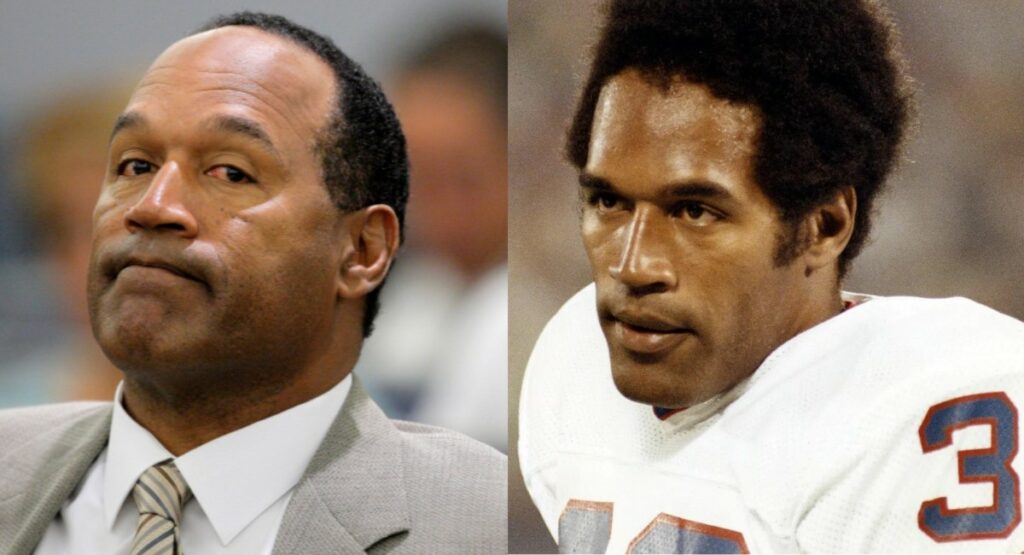No products in the cart.
News
O.J. Simpson Dead At 76 After Battle With Cancer, Family Announces
O.J. Simpson Dead At 76 After Battle With Cancer
O.J. Simpson Passes Away at 76 After Cancer Battle
O.J. Simpson, the former NFL superstar whose later years were overshadowed by legal controversies, died at the age of 76 after a prolonged battle with cancer, his family confirmed. According to a statement released by Simpson’s family on social media platform X (formerly Twitter), he passed away surrounded by his loved ones. “On April 10th, our father, Orenthal James Simpson, succumbed to his battle with cancer. He was surrounded by his children and grandchildren,” the statement detailed. The news of Simpson’s passing was further corroborated by his attorney in a conversation with TMZ, marking the end of the storied and tumultuous life of the American football icon.
On April 10th, our father, Orenthal James Simpson, succumbed to his battle with cancer.
He was surrounded by his children and grandchildren.
During this time of transition, his family asks that you please respect their wishes for privacy and grace.
-The Simpson Family
— O.J. Simpson (@TheRealOJ32) April 11, 2024
Legendary Football Career and Hall of Fame Induction
O.J. Simpson’s athletic prowess on the football field is a legacy that, for a time, seemed untouchable. Known affectionately as “The Juice,” Simpson was the first NFL player to rush over 2,000 yards in a single season—a feat he achieved in 1973, during a time when the NFL season spanned just 14 games. His groundbreaking performance not only set a new standard for running backs but also permanently etched his name in the annals of football history. Simpson’s remarkable career was crowned with his induction into the Pro Football Hall of Fame in 1985. Jim Porter, president of the Pro Football Hall of Fame, remarked on his passing, “His on-field contributions will be preserved in the Hall’s archives in Canton, Ohio.” Simpson’s football legacy, marked by exceptional talent and groundbreaking achievements, remains a significant chapter in the sport’s history.
An Unforgettable Icon in Collegiate Football
Before dominating the professional league, O.J. Simpson left an indelible mark on college football. Born on July 9, 1947, in San Francisco, California, Simpson’s athletic journey catapulted into the national spotlight at the University of Southern California (USC). As a Trojan, he quickly became one of the most celebrated college running backs of all time. His sophomore year ended with him as a runner-up for the Heisman Trophy, but it was just a prelude to his explosive senior year in 1968, when he won the coveted award. Perhaps the most memorable moment of his college career was his 64-yard touchdown run against UCLA, a play that remains one of the most iconic in college football history. His success at USC set the stage for his subsequent NFL stardom, making him a legend in the making from his earliest days on the field.
Cultural Impact Beyond the Gridiron
Simpson’s influence extended far beyond the football field. His charisma and athletic image made him an ideal candidate for advertising and entertainment, avenues he pursued with notable success in the 1970s and beyond. Simpson became a household name across America, thanks to his memorable advertising campaign with Hertz rental car service, where he was depicted sprinting through airports—a metaphor for his agility and speed. This campaign not only boosted his public profile but also marked a significant moment in advertising, showcasing an African American athlete as the face of a major national brand. His acting career included roles in popular films like the “The Naked Gun” series, where he played the bumbling police officer Nordberg. These roles, coupled with his charismatic presence, cemented his status as a celebrity who transcended sports, making O.J. Simpson a prominent figure in American pop culture during the 1970s and 1980s.
O.J. Simpson’s Legal Saga
O.J. Simpson’s legal troubles began with the 1994 murders of his ex-wife Nicole Brown Simpson and her friend Ronald Goldman. The subsequent criminal trial not only captivated the nation but also became one of the most publicized court cases in American history. Simpson’s trial was a media circus, characterized by daily broadcasts that glued millions to their TV screens. It exposed deep racial divides within the country and featured a cast of high-profile personalities, including defense lawyer Johnnie Cochran and prosecutor Marcia Clark.
The turning point of the trial came with the dramatic live television coverage of Simpson in his white Ford Bronco, leading police on a slow-speed chase through Southern California. This event alone set television viewing records and became a seminal moment in the convergence of celebrity culture and the legal system. Simpson’s legal team, dubbed the “Dream Team,” argued fervently against the charges, highlighting multiple mishandlings and procedural mistakes by the Los Angeles Police Department.
On October 3, 1995, the jury delivered a not guilty verdict, a decision that polarized public opinion along racial lines. Many in the African American community celebrated the verdict as a victory against a racially biased police system, while others saw it as a miscarriage of justice. The trial’s conclusion left an indelible mark on the American psyche, altering perceptions of the justice system and media’s role in society.
Civil Trial and Subsequent Legal Challenges
Although acquitted in the criminal murder trial, the legal battles for Simpson did not end there. In 1997, Simpson faced a civil trial brought by the families of Nicole Brown Simpson and Ronald Goldman. The civil court found Simpson liable for the wrongful deaths of Nicole and Goldman, a stark contrast to the criminal trial’s outcome. The jury in the civil case awarded the plaintiffs $33.5 million in compensatory and punitive damages, a sum that Simpson has largely failed to pay.
The civil trial verdict underscored the differences between criminal and civil court systems in the U.S., where the burden of proof is lower in civil cases. This outcome added another layer of public scrutiny to Simpson’s already controversial image and hinted at unresolved questions surrounding the murder case. The civil trial verdict did little to sway public opinion that remained divided over Simpson’s guilt or innocence.
In the years following the civil trial, Simpson’s life continued to be marked by legal issues. In 2008, he was arrested in Las Vegas for armed robbery and kidnapping, stemming from a dispute over sports memorabilia at a hotel. Simpson claimed he was retrieving personal items that had been stolen from him. He was convicted and sentenced to 33 years in prison, with eligibility for parole after nine years. This conviction occurred exactly 13 years to the day after his acquittal in the murder trial. Simpson was released on parole in October 2017, having served nine years of his sentence, but the shadow of his past continued to loom large over his post-incarceration life.
Cultural Impact and Media Representation
The O.J. Simpson saga has had a profound and lasting impact on American culture, particularly in how legal cases are viewed and consumed by the public. The trial and its participants have become ingrained in the national consciousness, often referenced in popular culture and academic discussions. Simpson’s story has been the subject of numerous documentaries, books, and a critically acclaimed television series, “The People v. O.J. Simpson: American Crime Story,” which portrayed the trial’s behind-the-scenes dynamics and its cultural implications.
Moreover, the trial highlighted the intersection of race, celebrity, and justice in America, themes that were explored in the ESPN documentary “O.J.: Made in America.” This documentary, which won an Academy Award, delved into Simpson’s rise and fall, examining his relationship with the African American community and his attempts to transcend racial identity. It also explored how his trial reflected larger societal issues and helped catalyze the 24-hour news cycle and the reality television phenomenon.
Simpson’s case also influenced the legal system, prompting discussions about the role of media in courtrooms, the conduct of police and prosecutors, and the need for reform in the criminal justice system. His trial became a case study in the law community and remains a reference point for debates on legal ethics, media influence, and racial bias in judicial proceedings.
Through all the years following his trials, Simpson’s life story has continued to fascinate and provoke debate, illustrating the complexities of American society. His death marks the end of a chapter but not the conclusion of the discussions and reflections his life story has sparked. Whether viewed as a tragic hero or a flawed individual, O.J. Simpson’s legacy continues to influence discussions on race, fame, and justice in America.
Honor the Legend with the Rip Oj Simpson T-Shirt!
Calling all sports and history enthusiasts! Do you want to cherish the memory of O.J. Simpson, a legendary figure with a life filled with both triumphs and tribulations? Grab the Rip Oj Simpson T-Shirt now – the perfect way to honor a legend.

OJ Simpson Juice Is Loose Touch Down Shirt
Rip Oj Simpson 1947 2024 T-Shirt
Rip Oj Simpson The Juice Is Loose T-Shirt
With its bold design and prominent O.J. Simpson image, this tee will help you:
- Show your respect and appreciation for O.J. Simpson.
- Preserve memories of a unique historical figure.
- Express your individuality and passion for sports.
Crafted in the USA using premium materials, the O.J. Simpson Tribute Tee ensures:
- Durability and comfort for all-day wear.
- Crisp, long-lasting prints.
- A wide range of sizes to fit every body type.
Own the O.J. Simpson Tribute Tee to:
- Pay tribute to a legend.
- Cherish memories of a bygone era.
- Assert your unique style.







